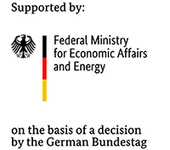The goal of QINROS, based on the Artificial Intelligence (AI) in Quantum Computing agenda of the Robotics Working Group and DFKI RIC, is to conceptualize and prototype an application field of quantum computing in robotics for space applications. The results are targeted at TRL 1-2.
QINROS is a joint project together with the AG Robotik of the University of Bremen.
The application field of QINROS is the efficient distribution of computing processes for (partially) autonomous space robotics. The distribution of computational processes describes the intersection and communication between classical computational methods and quantum-based or -enhanced approaches.
The DFKI RIC pursues the following technical work goals in QINROS: First, the conception and implementation of the demonstration scenario from the point of view of hardware structure, enabling of the mobile system to the given mission profile as well as the hardware and software implementation of the communication of the mobile system to the stationary quantum system. Furthermore, the conception and implementation of the QINROS workshop at the end of the project is the duty of the DFKI RIC. The scientific working goal of the DFKI RIC in QINROS is to develop the conception of the computational share of classical and quantum based methods in the demonstration scenario. For this purpose, several technical work goals are implemented together with the University of Bremen, such as the conception and implementation of a software framework for the comparison of classical and quantum-supported algorithms, as well as the software-technical implementation of the connection of the stationary quatum system. These work goals then lead to the selection, implementation and, if necessary, reformulation of quantum-based methods of optimization and machine learning, as well as the definition and selection of metrics for the evaluation of classical and quantum-based algorithms, and finally the execution of the necessary experiments and evaluation of current quantum technologies.
Partners
Universität Bremen


